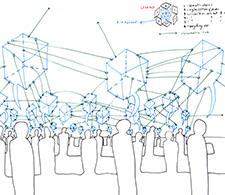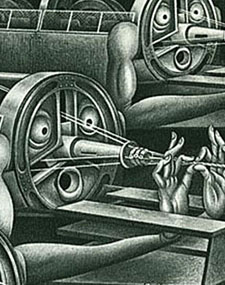Scott Pound is co-editor of Amodern and Associate Professor of English at Lakehead University. His current research examines the impact of media change on literary culture from the perspective of modern and contemporary avant-garde poetics. His scholarship has appeared in Canadian Literature, boundary 2, and English Studies in Canada.

Authors | Scott Pound
Articles on Amodern by Scott Pound
TECHNE, EPISTEME, AND THE TROUBLE WITH SPEECH
This essay examines the tendency for certain critical norms to be articulated as an opposition between writing and speech and the degree to which this opposition elevates epistemic principles over technical concerns at the expense of critical understanding.
THE AMODERNS: REENGAGING THE HUMANITIES
A Feature Interview with Alan Liu
Alan Liu is known as a humanities scholar, but he might best be described as also an engineer of the humanities. He founded Voice of the Shuttle (VoS), the original web-based humanities index and search engine, and is the author of Wordsworth: The Sense of History (Stanford, 1989), The Laws of Cool: Knowledge Work and the Culture of Information (Chicago, 2004), and Local Transcendence: Essays on Postmodern Historicism and the Database (Chicago, 2008). Through all these projects he has engineered a series of enabling hacks on humanities methodologies that have changed the way scholars understand humanities research.
AMODERN 1: THE FUTURE OF THE SCHOLARLY JOURNAL
The emergence of online scholarship is a momentous development and an occasion for some serious rethinking of the scholarly knowledge system. This serious rethinking has been happening in earnest for some time, but it isn’t just about technology. It extends deep into our conceptions of the historical, social, and institutional dimensions of scholarly practice.
The scholarly knowledge system we have today originated in the seventeenth century. It sanctifies the individuality, originality, objectivity, and intellectual property of scholars working alone (or in small groups) within a knowledge system defined by the fixity, uniformity, and proprietary status of print. Now, networked IT proffers an apparatus in which information and knowledge no longer tend to be fixed and proprietary; where cultural breakthroughs occur as the result of exercises in collective intelligence, large-scale collaboration, assemblage, and continuous revision; and where authorship and authority are increasingly established communally and anonymously rather than individually.
What constitutes knowledge, publication, research, peer review, authorship, and authority is quickly changing. Each of these sites of epistemic disruption raises stubborn questions. How will scholars harness the capabilities of networked media and still maintain rigorous standards of scholarly literacy and authority? How will institutions of higher learning integrate new forms of scholarly productivity into their review and reward structures? What will it take for peer-reviewed online scholarship to achieve a comparable status to print forms?
THE AMODERNS: TOWARDS PHILOLOGY IN A NEW KEY
A Feature Interview with Jerome J. McGann
No scholar has done more than Jerome McGann to expand our understanding of the nature of print and digital media. His experience as an editor of print media during the 70s and the 80s resulted in a drive to rehistoricize editorial practice that has revolutionized textual scholarship. In the early 90s, he began to survey a digital future that would involve the colossal task of reconstructing the entirety of our cultural inheritance for display on digital networks. For McGann, the question we face is not so much how we get on with the future, but “What kind of research and educational program can integrate the preservation and study of these two radically different media?”







